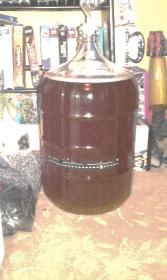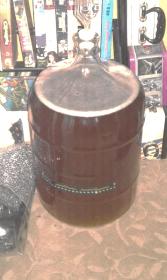I tried an experiment similar to this about a year ago. I wanted to see how pure apple juice would react when fermented without additional sugar or acid additions. I even made it sparkling, like this recipe. It came out to about 6.2% alcohol but it tasted flat, without the "bite" that I associate with hard ciders.
In my opinion, this recipe would benefit from the addition of some acid (acid blend, tartaric, malic, etc), unless the raw cider was already very tart. The relatively low alcohol content doesn't present a problem as long as it's consumed within a year or so.
As a relative novice at hard ciders I can't speak to some of your comments, but I will say this (in another thread I just posted to, I am having trouble with carbonation, unfortunately). But after having done 3 batches so far I would say off the top of my head that anything lacking the tartness (malic acid, methinks) of apple cider isn't going to be at all tart in the finished product. After all apple juice is supposed to be sweet, although you can taste a wee bit of tartness if you close your eyes LOL.
Anyway I did a lot of research before my latest attempt last fall and I have a couple suggestions. One is that the Campden tablets, whatever they do, need to be added to kill off or inhibit the wild yeasts from fermenting, unless you like to play Russian Roulette with whatever wild yeasts inhabit your unpasteurized cider. The rule of thumb is to wait 48-72 hours for the tablets to do their work and are rendered inert before priming (I used a specific White labs apple cider yeast). Letting it ferment out all the way will keep the alcohol content higher, the vast majority of the sugars are now converted.
I read in a very detailed book about cider making that what is then left is almost all malolactose sugars, which you can convert to malic acid by doing a secondary malolactose bacteria "fermentation" (although it isn't really fermentation at all) to get the tartness of "authentic" dry English cider. I rack it off and do a secondary fermentation with the yeast saved from the first after a few weeks to convert the majority of the sugars, then rack off again after a few weeks for the malic acid conversion. After a few more weeks (or more, it doesn't really matter at this point), prime and bottle but as I said my priming this time was not adequate to get much carbonation at all. I think the longer you let it sit on the bacteria the faster it "matures", so you don't need to wait 6 months or a year to drink it.
And to the last poster, you shouldn't get "sour" but "acidic" flavors aka "sour" or tart apples. Maybe you are confusing the two? If your cider was made the traditional way it will have mostly tart apples and a little "dessert" apples thrown in for sweetness and complexity of flavor. If it ferments out completely and you do the malolactose conversion the sweetness will all but disappear.
If it's mostly dessert apples (which I suspect is the case with the majority of store bought ciders) you will get what you started with, maybe that's why it's sour or flat tasting. I used to get my cider form a local guy before my trees matured and started pumping out the volume a few years ago. I know that he used a mix of at least four varieties, one of which was a traditional English cider apple ("wild apples" over here, not crabapples), only one or two of which were dessert apples. That stuff was worlds apart from grocery store ciders as far as complexity and tartness.
After all that my cider isn't flat tasting at all, but very dry and has pretty complex flavors. See the other thread if you can help me with the carbonation





